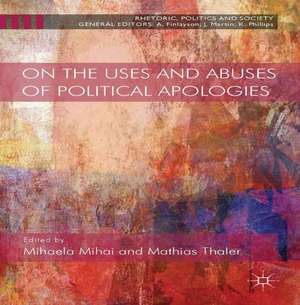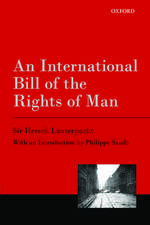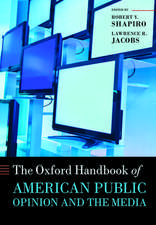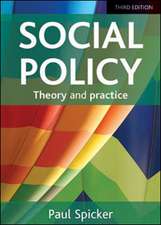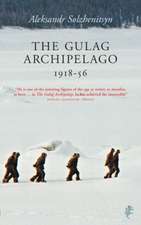On the Uses and Abuses of Political Apologies: Rhetoric, Politics and Society
Autor Mihaela Mihai, Mathias Thaleren Limba Engleză Hardback – 8 iul 2014
| Toate formatele și edițiile | Preț | Express |
|---|---|---|
| Paperback (1) | 383.33 lei 6-8 săpt. | |
| Palgrave Macmillan UK – 2014 | 383.33 lei 6-8 săpt. | |
| Hardback (1) | 390.63 lei 6-8 săpt. | |
| Palgrave Macmillan UK – 8 iul 2014 | 390.63 lei 6-8 săpt. |
Din seria Rhetoric, Politics and Society
-
 Preț: 178.02 lei
Preț: 178.02 lei -
 Preț: 346.34 lei
Preț: 346.34 lei - 20%
 Preț: 690.25 lei
Preț: 690.25 lei - 15%
 Preț: 699.45 lei
Preț: 699.45 lei - 15%
 Preț: 638.89 lei
Preț: 638.89 lei - 15%
 Preț: 696.50 lei
Preț: 696.50 lei -
 Preț: 389.88 lei
Preț: 389.88 lei -
 Preț: 385.62 lei
Preț: 385.62 lei -
 Preț: 386.61 lei
Preț: 386.61 lei - 15%
 Preț: 638.43 lei
Preț: 638.43 lei - 18%
 Preț: 781.62 lei
Preț: 781.62 lei - 15%
 Preț: 645.14 lei
Preț: 645.14 lei - 15%
 Preț: 640.71 lei
Preț: 640.71 lei - 18%
 Preț: 891.02 lei
Preț: 891.02 lei - 15%
 Preț: 584.76 lei
Preț: 584.76 lei - 9%
 Preț: 635.93 lei
Preț: 635.93 lei - 18%
 Preț: 1004.36 lei
Preț: 1004.36 lei - 15%
 Preț: 696.82 lei
Preț: 696.82 lei - 18%
 Preț: 1004.00 lei
Preț: 1004.00 lei - 15%
 Preț: 641.20 lei
Preț: 641.20 lei - 15%
 Preț: 697.65 lei
Preț: 697.65 lei - 18%
 Preț: 778.76 lei
Preț: 778.76 lei -
 Preț: 479.29 lei
Preț: 479.29 lei -
 Preț: 483.70 lei
Preț: 483.70 lei - 18%
 Preț: 886.43 lei
Preț: 886.43 lei - 18%
 Preț: 781.62 lei
Preț: 781.62 lei - 9%
 Preț: 676.90 lei
Preț: 676.90 lei -
 Preț: 352.80 lei
Preț: 352.80 lei - 18%
 Preț: 897.14 lei
Preț: 897.14 lei
Preț: 390.63 lei
Nou
Puncte Express: 586
Preț estimativ în valută:
74.75€ • 78.04$ • 61.86£
74.75€ • 78.04$ • 61.86£
Carte tipărită la comandă
Livrare economică 04-18 aprilie
Preluare comenzi: 021 569.72.76
Specificații
ISBN-13: 9781137343710
ISBN-10: 1137343710
Pagini: 246
Ilustrații: XII, 258 p.
Dimensiuni: 140 x 216 x 23 mm
Greutate: 0.48 kg
Ediția:2014
Editura: Palgrave Macmillan UK
Colecția Palgrave Macmillan
Seria Rhetoric, Politics and Society
Locul publicării:London, United Kingdom
ISBN-10: 1137343710
Pagini: 246
Ilustrații: XII, 258 p.
Dimensiuni: 140 x 216 x 23 mm
Greutate: 0.48 kg
Ediția:2014
Editura: Palgrave Macmillan UK
Colecția Palgrave Macmillan
Seria Rhetoric, Politics and Society
Locul publicării:London, United Kingdom
Cuprins
1. Introduction; Mihaela Mihai and Mathias Thaler PART I: THEORETICAL FOUNDATIONS 2. Beyond the Ideal Political Apology; Alice MacLachlan 3. Political Apologies and Categorical Apologies; Nick Smith PART II: RITES AND RITUALS OF REGRET 4. From Mea Culpa to Nostra Culpa: A Reparative Apology from the Catholic Church?; Danielle Celemajer 5. The Power of Ritual Ceremonies in State Apologies: An Empirical Analysis of the Bilateral Polish-Russian Commemoration Ceremony in Katyn in 2010; Michel-Andre Horelt 6. Confessing the Holocaust: The Evolution of German Guilt; Stefan Engert PART III CHALLENGING CASES 7. Revisiting the 'Membership Theory of Apologies': Apology Politics in Australia and Canada; Melissa Nobles 8. The Canadian Apology to Indigenous Residential School Survivors: A Case Study of Re-Negotiation of Social Relations; Neil Funk-Unrau 9. What Makes a State Apology Authoritative? Lessons from Post-Authoritarian Brazil; Nina Schneider PART IV: OBSTACLES AND LIMITATIONS 10. The Apology in Democracies: Reflections on the Challenges of Competing Goods, Citizenship, Nationalism and Pluralist Politics; Michael Cunningham 11. An Apology for Public Apologies; Juan Espindola 12. Reasoning Like a State: Integration and the Limits of Official Regret; Cindy Holder
Recenzii
'This outstanding collection delivers on its title, going straight to what is specifically political in political apologies and showing how political apologies can be better or worse. These concise and vibrant essays, threaded throughout with concrete and timely examples, break through commonplaces to new insight and theory. This book is essential for those concerned with the practice or the theory of apology in the political realm and with the role of apology in societies dealing with the past.' - Margaret Urban Walker, Donald J. Schuenke Chair in Philosophy, Marquette University, USA
'In an age of 'meae culpae", On the Uses and Abuses of Political Apologies provides a theoretically rich and clear-eyed critique of the motivations behind official acts of regret and the meaning, if any, that victims of state violence derive from them. Are state apologies a 'smoke screen' for obscuring the political will to hold perpetrators accountable and compensate victims? Or can they provide a tangible and visible expression of official acknowledgement and change? This book delivers poignant insights into this conundrum-both ominous and hopeful.' - Eric Stover is Faculty Director of the Human Rights Center at the University of California, Berkeley School of Law and the author of The Witnesses: War Crimes and the Promise of Justice in The Hague
'This volume explores some of the conundrums and complexities of the political apology. By examining cases arising in a number of national contexts, it provides a valuable contribution to the vibrant debate over the usefulness of apologies for past political misdeeds. Anyone examining this area will have to wrestle with it.' - John Torpey, Professor of Sociology, The Graduate Centre, City University of New York, USA.
'In an age of 'meae culpae", On the Uses and Abuses of Political Apologies provides a theoretically rich and clear-eyed critique of the motivations behind official acts of regret and the meaning, if any, that victims of state violence derive from them. Are state apologies a 'smoke screen' for obscuring the political will to hold perpetrators accountable and compensate victims? Or can they provide a tangible and visible expression of official acknowledgement and change? This book delivers poignant insights into this conundrum-both ominous and hopeful.' - Eric Stover is Faculty Director of the Human Rights Center at the University of California, Berkeley School of Law and the author of The Witnesses: War Crimes and the Promise of Justice in The Hague
'This volume explores some of the conundrums and complexities of the political apology. By examining cases arising in a number of national contexts, it provides a valuable contribution to the vibrant debate over the usefulness of apologies for past political misdeeds. Anyone examining this area will have to wrestle with it.' - John Torpey, Professor of Sociology, The Graduate Centre, City University of New York, USA.
Notă biografică
Danielle Celermajer, University of Sydney, AustraliaMichael Cunningham, University of Wolverhampton, UKStefan Engert, J. W. Goethe University Frankfurt/Main, GermanyJuan Espindola, National University of MexicoNeil Funk-Unrau, Menno Simons College, CanadaCindy Holder, University of Victoria, CanadaMichel-André Horelt, Ludwig-Maximilians-University of Munich, GermanyAlice MacLachlan, York University, CanadaMelissa Nobles, Massachusetts Insitute of Technology, USANina Schneider, University of Konstanz, GermanyNick Smith, University of New Hampshire, USA
